Champify Alternatives
A direct comparison of 10 Champify alternatives. This guide helps you evaluate features and find the right platform for your company.

Champify is a popular tool, and for good reason. Many users find it great for tracking when past customers or champions switch jobs. This helps sales teams find warm leads and build a pipeline with people who already know their product, which is where it shines.
But no tool is perfect. Some users report occasional integration issues or outdated data. We've analyzed the best alternatives based on G2 reviews, comparing their pros and cons to help you shortlist the top options for a deeper review. Let's get started.
11x: Digital Workers for Sales Teams
If your team wants to use digital workers for sales support, 11x offers a specific solution. It provides autonomous agents to handle repetitive tasks. This allows your sales representatives to focus on client relationships and deal closure.
11x is a GTM platform with AI agents that manage the sales process. We replace separate tools for data enrichment, outreach, and email warmup to unify your GTM stack on a single platform.
Our AI agent, Alice, finds prospects, runs outreach, and updates your CRM. A second agent, Julian, qualifies inbound leads and books meetings.
Champify Alternatives
The following section provides a detailed review of the top Champify alternatives. We analyze each tool's pricing, main features, and its advantages and drawbacks compared to Champify.
1) UserGems
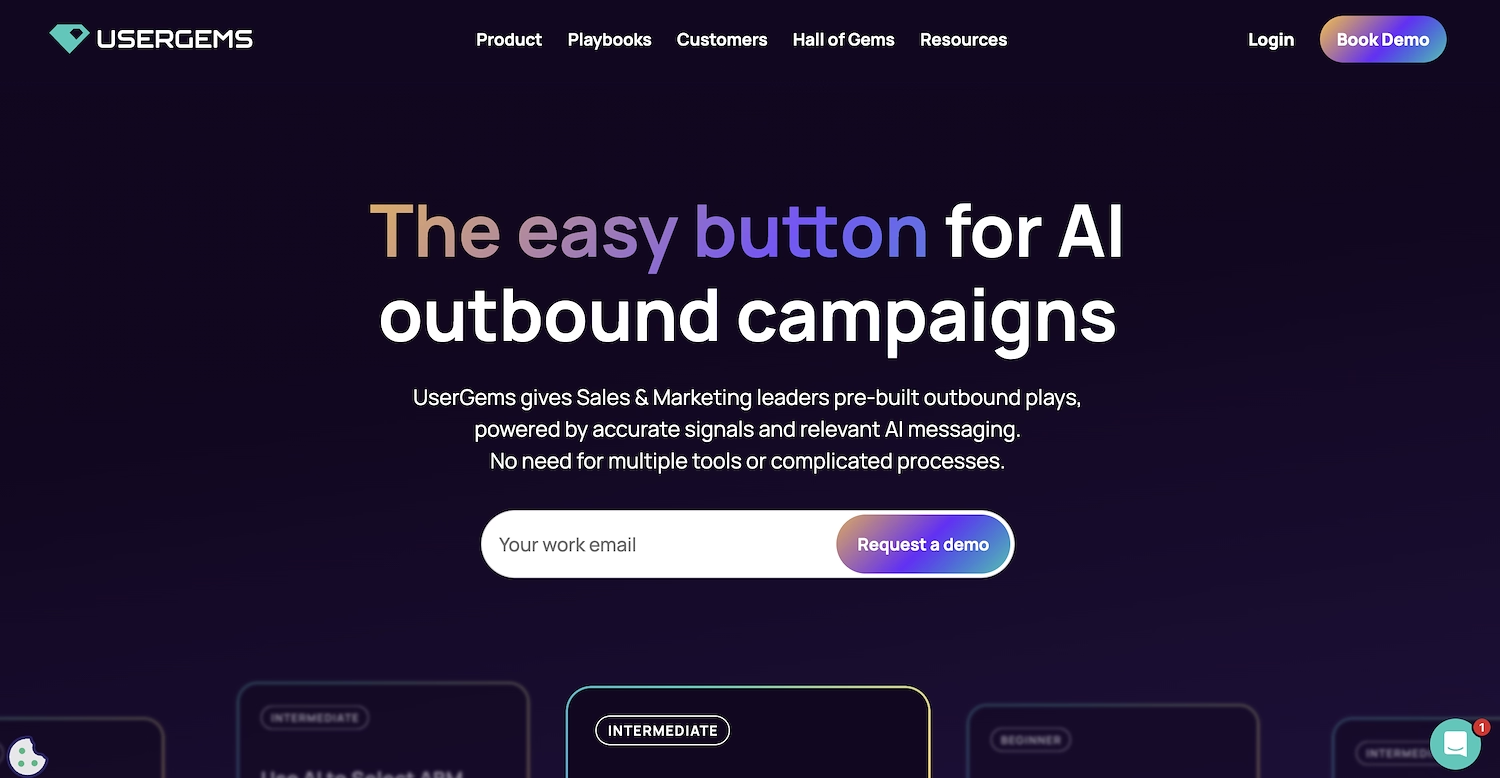
UserGems provides an AI outbound campaign platform. It uses a library of signals, like job changes and funding events, to find accounts and contacts. An AI agent, Gem-E, then drafts outreach sequences and call talk tracks based on this data.
This system helps teams reach past champions at new companies. It builds target lists, scores contacts, and writes personalized messages, which it pushes into a CRM or sales tool.
UserGems's Main Features
- Writes personalized email sequences and cold-call talk tracks using first- and third-party data with its Gem-E AI outbound agent.
- Provides a campaign library with over 350 pre-built plays that can be activated with a few clicks.
- Uses proprietary datasets and machine learning models intended to deliver higher data accuracy than competing providers.
- Offers a money-back pipeline guarantee that provides a refund if a $50,000 spend does not generate at least $50,000 in revenue.
How UserGems Compares to Champify
Average Review Score: 4.7/5 stars based on 143 G2 reviews.
- UserGems provides an AI agent that drafts outreach sequences for new leads. This automates a step that sales teams often handle manually with Champify's data.
- It includes a library with over 350 pre-built campaign plays. This feature gives teams structured outreach options beyond the simple lead alerts from Champify.
- The tool also finds new prospects that match your ideal customer profile. This broadens lead generation beyond Champify's focus on past champions.
- The platform offers a money-back pipeline guarantee. This provides financial assurance on performance, a feature not stated for Champify.
UserGems's Drawbacks Compared to Champify
- Some users report occasional data inaccuracies with contact information. This could require sales teams to spend extra time verifying leads, which may be less of an issue with a more focused tool like Champify.
- The platform has a higher perceived cost and may take up to a month to implement. This is a consideration for teams that need a solution with a faster return on investment than the typical eight months.
- Its broad feature set, including AI agents, might be too complex for teams that only need the simple job-change tracking that Champify provides.
Cost and Value Comparison
While both tools have a high perceived cost according to user reviews, Champify reports a faster return on investment at five months versus eight for UserGems. Since pricing models can vary significantly, we recommend visiting the company’s official website for the most accurate information.
2) ZoomInfo SalesOS
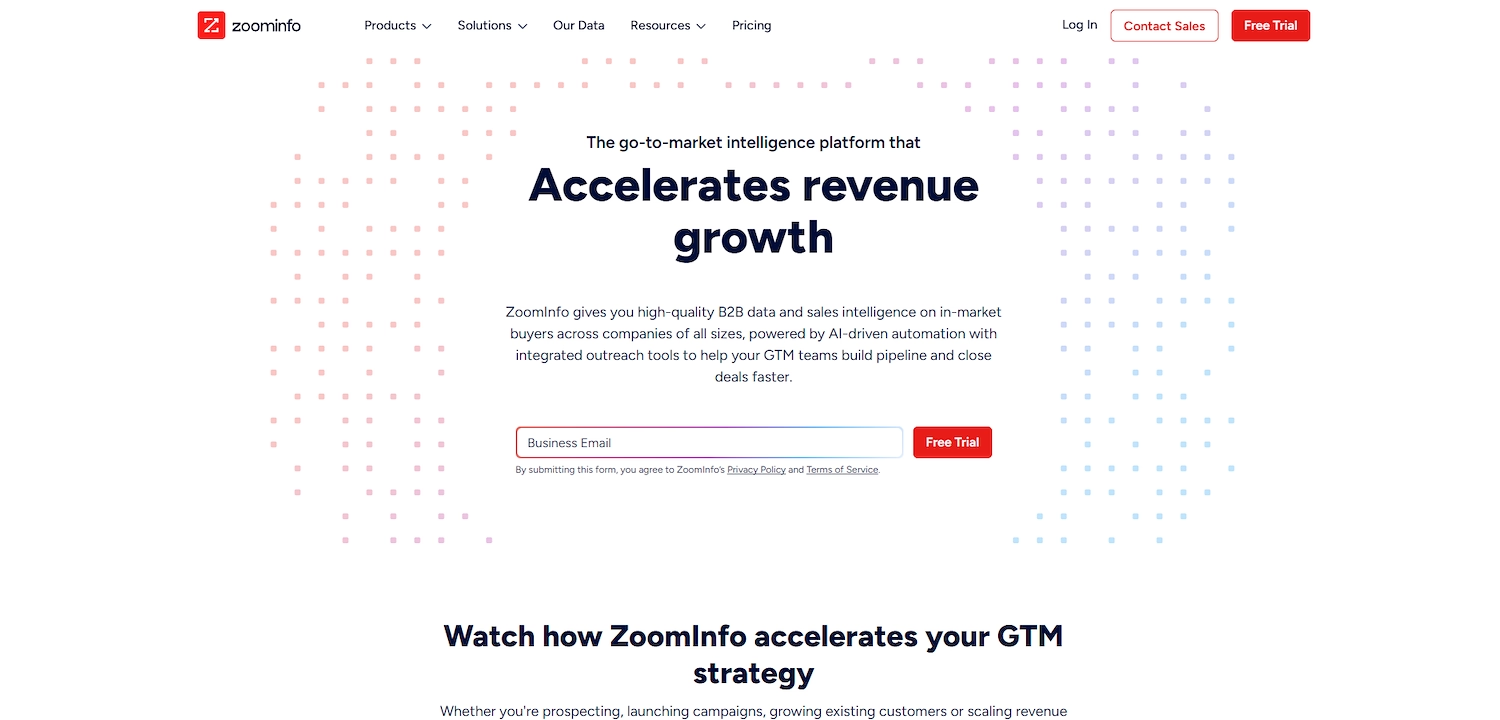
ZoomInfo SalesOS is a go-to-market intelligence platform that unifies contact data, buyer-intent signals, and engagement tools. It helps B2B revenue teams identify and connect with buyers. The system provides data to build lead lists, enrich CRM records, and find accounts that show intent to buy.
ZoomInfo SalesOS's Main Features
- Offers conversation intelligence to analyze call and meeting interactions.
- Turns anonymous website visitors into pipeline opportunities through real-time tracking.
- Provides a generative-AI companion, Copilot, that surfaces insights and drafts outreach.
- Uncovers the next-best customers and ideal customer profiles using predictive modeling.
How ZoomInfo SalesOS Compares to Champify
Average Review Score: 4.5/5 stars based on 8,738 G2 reviews.
- ZoomInfo SalesOS provides a large database to find new customers. This differs from Champify, which focuses on tracking job changes of past champions.
- The platform includes an AI companion, Copilot, that suggests who to contact and drafts messages. This automates outreach tasks that teams using Champify often handle manually.
- It identifies anonymous website visitors and tracks buyer intent signals. This offers a proactive way to find new prospects, unlike Champify's model of tracking known contacts.
- This tool offers conversation intelligence to analyze sales calls and meetings. This provides insights for sales coaching, a feature not available in Champify.
ZoomInfo SalesOS's Drawbacks Compared to Champify
- The platform's broad scope can be a disadvantage for teams that only need job-change alerts for past champions. Champify provides a more focused tool for this specific task, which can be simpler to use.
- Some users find that the vast amount of data in ZoomInfo SalesOS can sometimes lead to inaccuracies. In contrast, Champify's focus on a curated list of past customers may result in more reliable alerts for that specific group.
- Its implementation can take up to a month, with a return on investment period of around 14 months. This is a longer timeline compared to Champify, which shows a return in about five months.
Cost and Value Comparison
While both tools have a high perceived cost according to user reviews, Champify reports a faster return on investment at five months versus 14 for ZoomInfo SalesOS. Since pricing models can vary significantly, we recommend visiting the ZoomInfo SalesOS 's official website for the most accurate information.
3) LinkedIn Sales Navigator
LinkedIn Sales Navigator is a sales intelligence tool that uses the LinkedIn network to help teams find and engage with prospects. It provides advanced search filters, lead recommendations, and real-time updates to support sales outreach and relationship building.
LinkedIn Sales Navigator's Main Features
- Offers advanced lead and account search with specific filters like company size, function, and seniority level.
- Provides custom lead recommendations and alerts on job changes or company news for saved leads and accounts.
- Allows users to send InMail messages to connect with prospects outside their immediate network.
- Integrates with CRM systems to sync sales activities, notes, and lead information.
How LinkedIn Sales Navigator Compares to Champify
Average Review Score: 4.3/5 stars based on 10,000+ G2 reviews.
- Sales Navigator offers a vast prospecting database from the entire LinkedIn network. This is broader than Champify's specific focus on tracking your company's past customers and champions.
- It includes built-in messaging through InMail. This allows direct outreach on the platform, a feature not central to Champify, which provides data for outreach on other channels.
- The tool provides general job change alerts for any saved lead. Champify's alerts are more targeted, as they are specifically for contacts already in your CRM.
- It is a tool for general prospecting and lead generation. Champify is a specialized tool that helps teams use existing relationships with past customers.
LinkedIn Sales Navigator's Drawbacks Compared to Champify
- The platform does not automatically identify "champions" from your CRM. Users must manually build lists, which is the core automated function of Champify.
- Its job change alerts are not specifically curated for your past customers. This can create noise for sales teams who only want to track former champions.
- The scope of the tool can be complex for teams that only need simple job-change tracking. Champify offers a more direct solution for that specific need.
Cost and Value Comparison
LinkedIn Sales Navigator operates on a per-user, per-month subscription model. While G2 reviews do not provide a clear ROI timeline, its cost structure differs from the enterprise-level pricing common with tools like Champify. For detailed pricing, visit the official website.
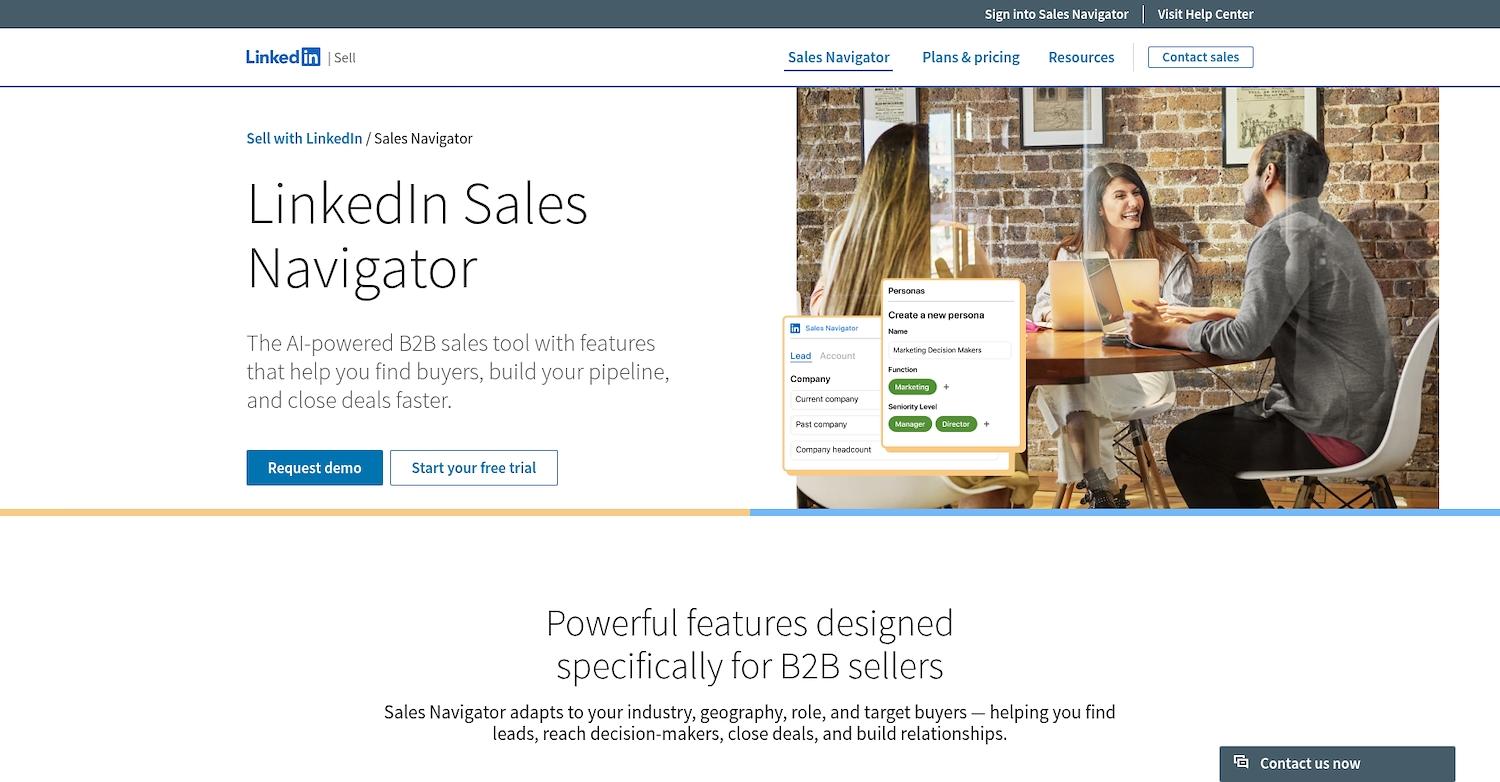
LinkedIn Sales Navigator is a sales intelligence tool that uses the LinkedIn network to help sales teams find and connect with prospects. The platform provides alerts on job changes for saved leads and accounts and offers advanced search filters for company size, function, and seniority level.
Users can send InMail messages to connect with people outside their network and sync information with a CRM.
LinkedIn Sales Navigator's Main Features
- It provides advanced search filters to find leads and accounts by criteria like company size, function, and seniority level.
- The platform allows users to send InMail messages to contact prospects who are not in their immediate network.
- It syncs sales activities, notes, and lead information with integrated CRM systems.
- The tool delivers custom lead recommendations for saved leads and accounts.
How LinkedIn Sales Navigator Compares to Champify
Average Review Score: 4.3/5 stars based on 1,990 G2 reviews.
- The platform provides access to the entire LinkedIn network for prospecting. This offers a broader search for new leads than Champify's focus on tracking only past customers.
- It includes a built-in messaging feature, InMail, to contact prospects directly. Champify provides lead data but does not have a native outreach tool.
- Users can use advanced search filters to find leads by specific criteria like company size. This provides more granular targeting than Champify's focus on job changes of known champions.
- Sales Navigator provides job change alerts for any saved lead. This is a broader approach compared to Champify, which specifically tracks only past champions from your CRM.
Disadvantages Compared to Champify
- LinkedIn Sales Navigator requires users to build lead lists manually. It does not automatically find past customers from a CRM, which is the primary function of Champify.
- The tool's job change alerts are for any saved lead, not just past customers. This may create irrelevant notifications compared to the highly focused alerts from Champify.
- Its features are for general prospecting and can be too much for some teams. Champify provides a simpler tool focused only on tracking job changes of former champions.
Cost and Subscription Models
While both tools have a high perceived cost based on user reviews, Champify offers a faster return on investment at five months compared to 13 months for LinkedIn Sales Navigator. Since pricing models can vary, we recommend visiting the LinkedIn Sales Navigator's official website for the most accurate information.
4) Demandbase
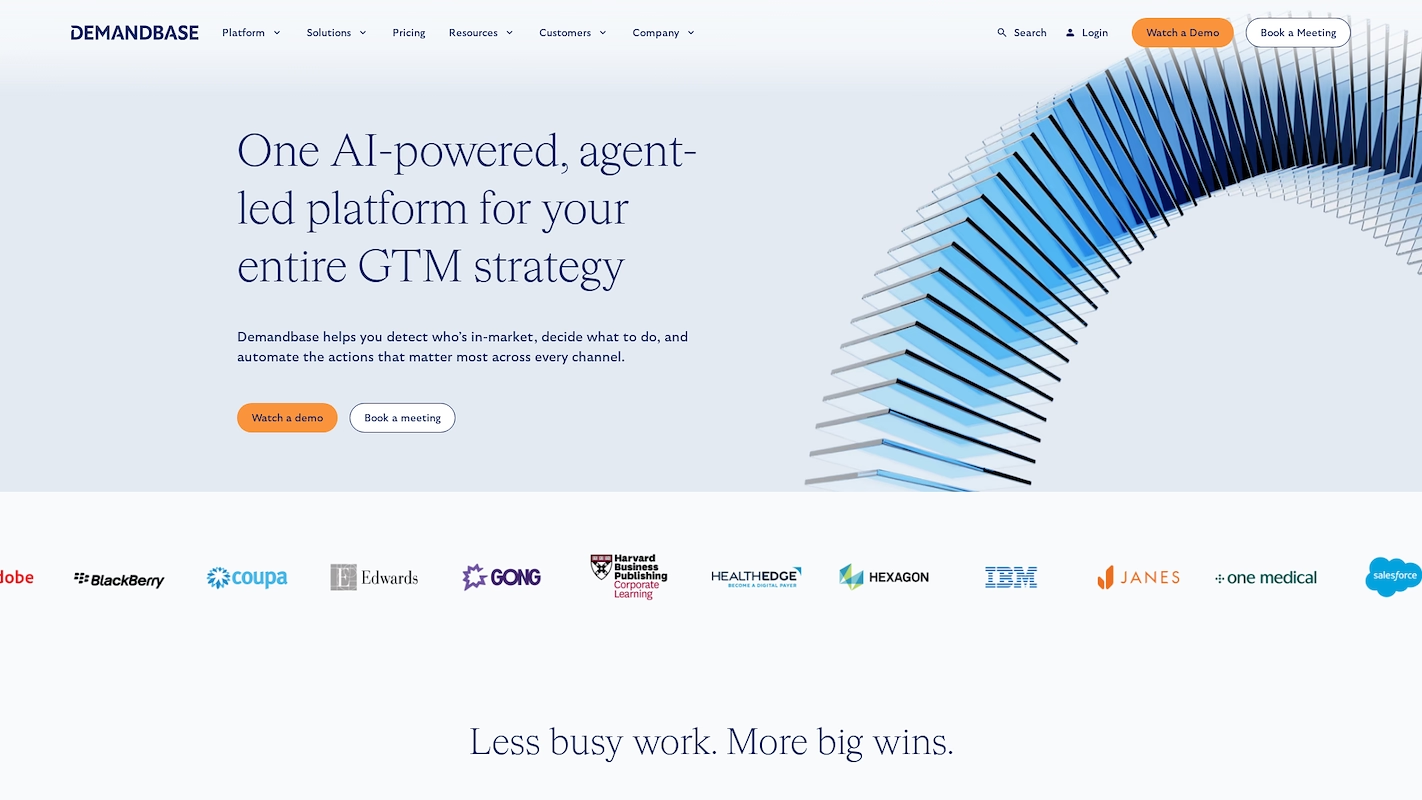
Demandbase is an Account-Based Experience platform that helps B2B teams coordinate sales and marketing efforts. It provides account intelligence to find and engage target companies. This intelligence can include signals like job changes, which helps teams discover new points of contact within an account.
Demandbase's Main Features
- Ingests first-party signals from CRM and web sources and augments them with third-party firmographic and intent data.
- Uses "Agentbase" AI agents to automate plays across marketing, advertising, and sales channels.
- Detects, scores, and prioritizes entire buying groups within an account instead of just individual leads.
- Delivers intent-based ads through a native B2B demand-side platform (DSP).
How Demandbase Compares To Champify
Average Review Score: 4.4/5 stars based on 1,843 G2 reviews.
- Demandbase operates as a full Account-Based Experience platform to align sales and marketing teams. This is a broader scope than Champify, which focuses only on sales alerts for job changes.
- It identifies and scores entire buying groups within a target company. Champify, in comparison, tracks individual contacts when they switch jobs.
- The platform uses AI agents to automate tasks across marketing, sales, and advertising. This offers more automation than Champify, which provides data for teams to act on manually.
- This tool includes a native demand-side platform (DSP) to run ad campaigns based on buyer intent. Champify does not have advertising features; it supplies lead data for other tools.
Demandbase's Drawbacks Compared to Champify
- Demandbase's broad feature set can be complex for teams that only need job change alerts. In contrast, Champify provides a more focused tool for that specific purpose.
- The tool's implementation can take around two months, with a return on investment of about 13 months. This is a longer timeline compared to Champify, which shows a return in approximately five months.
- Some users report that contact information can sometimes be incomplete. This may require extra verification, unlike Champify, which focuses on a curated list of past customers from a CRM.
- It does not automatically identify past champions from a CRM when they change jobs. This core function of Champify may require manual work within the broader Demandbase platform.
Cost and Value Comparison
While both tools have a high perceived cost based on user reviews, Champify reports a faster return on investment at five months versus 13 for Demandbase. Since pricing models can vary significantly, we recommend visiting the Demandbase official website for the most accurate information.
5) 6sense
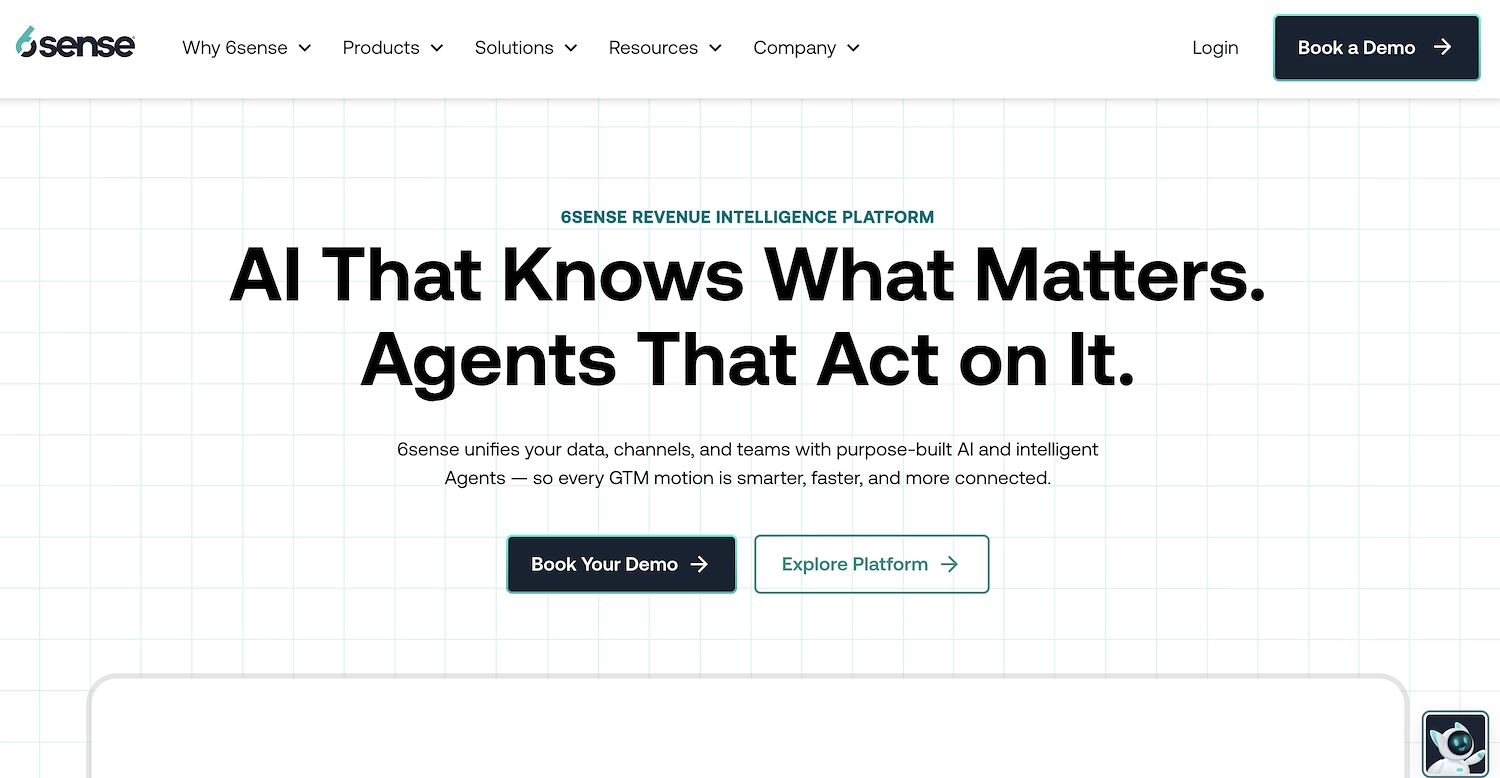
6sense is a revenue AI platform that uncovers anonymous buying behavior to find accounts ready to buy. It uses intent data and tracks signals, such as job changes, to help sales and marketing teams prioritize outreach and connect with the right contacts inside target accounts.
6sense's Main Features
- Captures trillions of daily intent, company, and contact signals through its Signalverse data cloud.
- Uses its 6AI layer to score, prioritize, and recommend actions based on raw data signals.
- Provides autonomous AI email agents that personalize outreach, respond to prospects, and book meetings.
- Offers a drag-and-drop canvas to build omni-channel campaigns triggered by AI signals across marketing, sales, and advertising.
How 6sense Compares to Champify
Average Review Score: 4.3/5 stars based on 1,086 G2 reviews.
- 6sense uncovers anonymous buying behavior to find new accounts that show intent. This differs from Champify, which focuses on tracking job changes of known contacts.
- It provides autonomous AI email agents that personalize outreach and book meetings. This automates a step that sales teams often handle manually with data from Champify.
- The platform helps build omni-channel campaigns triggered by AI signals. This provides a more comprehensive execution tool compared to Champify, which primarily provides data alerts.
- This tool captures a wide range of intent signals from its data cloud. This offers deeper insights into account activity than the specific job-change alerts that Champify provides.
6sense's Drawbacks Compared to Champify
- 6sense does not automatically identify past champions from a CRM who change jobs. This is a core function of Champify, so teams may need to do manual work to find these specific contacts.
- The platform's broad feature set for account-based marketing can be complex. This might be a drawback for teams that only need the focused job-change tracking that Champify offers.
- It has a longer time to value, with an implementation of about three months and a return on investment of 13 months. In comparison, Champify reports a return in approximately five months.
Cost and Value Comparison
While both tools have a high perceived cost based on user reviews, Champify reports a faster return on investment at five months versus 13 for 6sense. Since pricing models can vary significantly, we recommend visiting the 6sense official website for the most accurate information.
Add Digital Workers to Your Sales Team with 11x
If your sales team needs support with repetitive tasks, consider 11x. The platform provides digital workers to find prospects, manage outreach, and book meetings. This allows your sales representatives to concentrate on deal closure and client relationships. See if 11x fits your team's needs.
With 11x, we use AI to run your sales playbook. Our agent Alice finds accounts, enriches their data, and runs outreach. Julian qualifies prospects and schedules meetings. We replace separate tools for intent signals and email warmup, unifying your GTM stack on one platform.
Book a Demo to see 11x in action.
6) People.ai
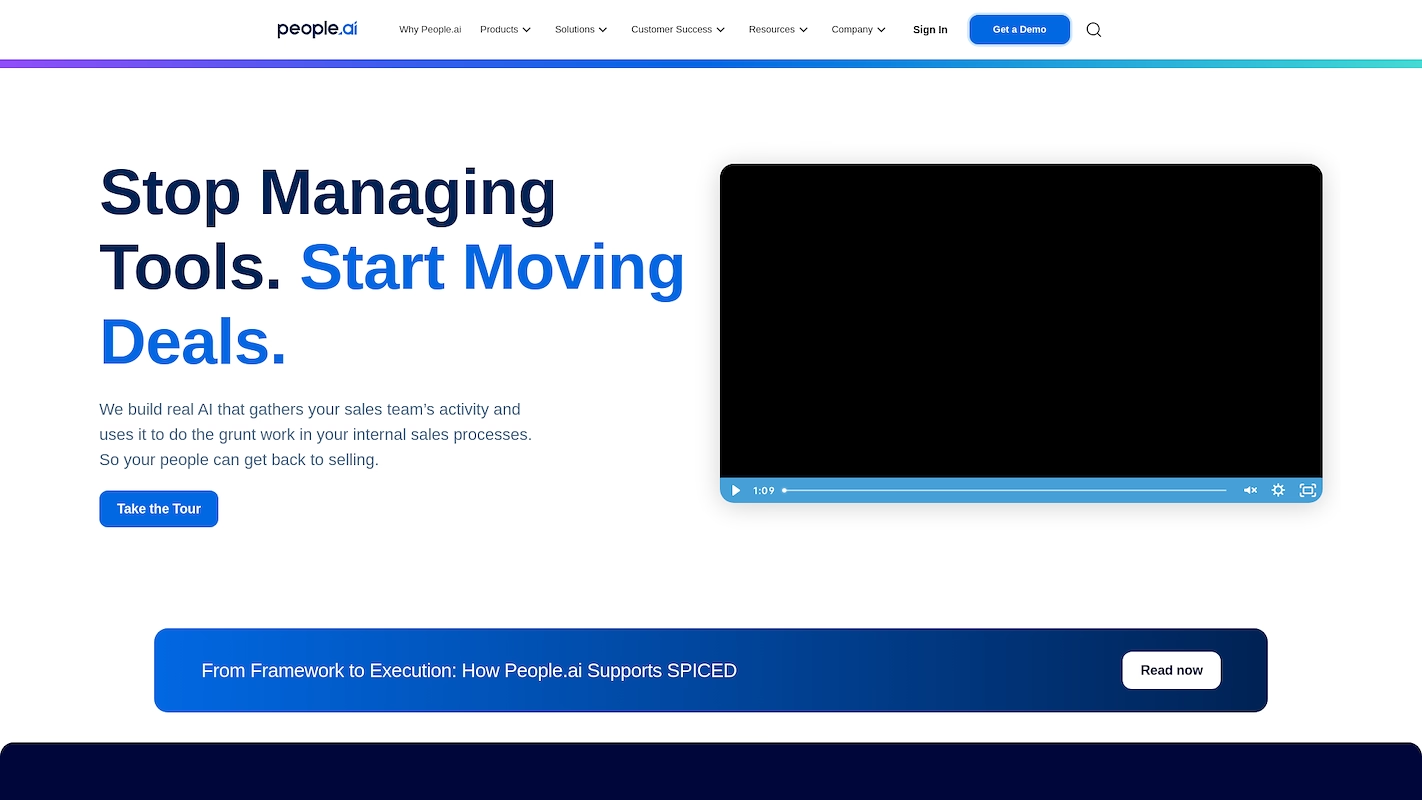
People.ai is a revenue intelligence platform that captures contact and customer activity data. It uses this information to automatically update the CRM and provide insights for pipeline management and account plans.
The platform helps sales teams discover new opportunities. It tracks when contacts change jobs, which can open doors at new companies.
People.ai's Main Features
- Collects more than 1.8 million sales activities per hour and consolidates them with CRM data.
- Generates automated, data-backed account plans to align pre-sale, post-sale, and renewal teams.
- Automates deal qualification and visualizes deal health to focus representatives on opportunities most likely to close.
- Combines pipeline management and forecasting in a single interface, powered by custom AI agents trained on a customer's revenue model.
How People.ai Compares to Champify
Average Review Score: 4.4/5 stars based on 463 G2 reviews.
- People.ai automatically captures sales activities from multiple sources to update the CRM. This provides a broader view of engagement compared to Champify, which focuses on job change alerts.
- The platform generates data-backed account plans to align sales and renewal teams. This is different from Champify's approach of tracking individual champions when they move to new companies.
- It automates deal qualification and visualizes deal health to help teams focus on winnable opportunities. Champify provides the initial lead from a job change but does not include deal management features.
- This tool uses custom AI agents for pipeline management and forecasting. This offers predictive insights that are different from Champify's champion tracking alerts.
People.ai's Disadvantages Compared to Champify
- People.ai does not automatically identify past customers from a CRM who change jobs. This is the primary function of Champify, so teams may need to do manual work to find these specific contacts.
- Its extensive features for revenue intelligence might be too much for teams that only need simple job-change alerts. Champify provides a more focused tool for that specific task.
- The platform has a longer time to value, with a return on investment of around 13 months. This is a longer period compared to Champify, which typically shows a return in about five months.
Cost and Value Comparison
While both tools have a high perceived cost based on user reviews, Champify reports a faster return on investment at five months versus 13 for People.ai. Since pricing models can vary significantly, we recommend visiting the People.ai's official website for the most accurate information.
7) Apollo.io
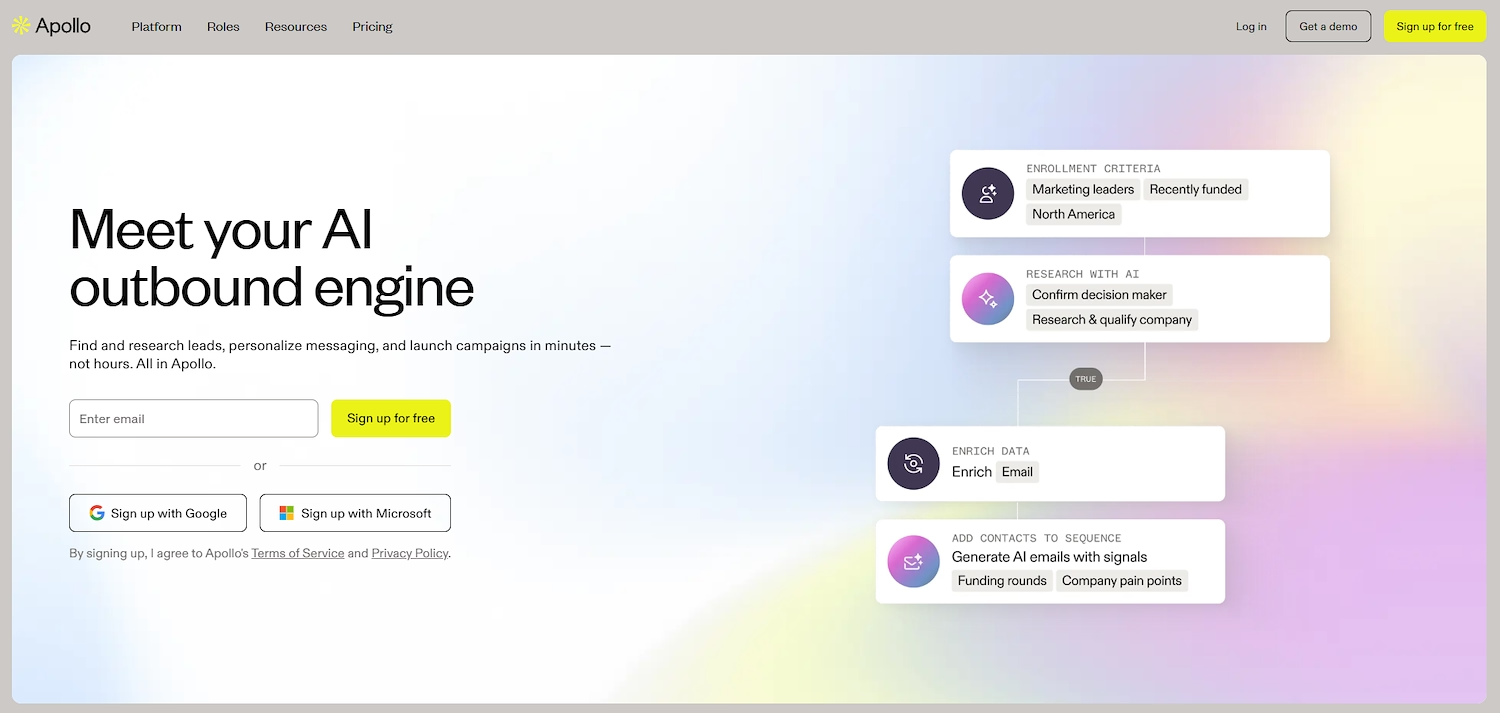
Apollo.io is a sales intelligence and engagement platform with a large contact database. Teams use it to find prospects with filters, engage buyers, and track data signals. These signals include job changes, which help identify new opportunities with contacts at different companies.
Apollo.io's Main Features
- Provides a large contact database to find prospects with specific filters.
- Offers tools to engage buyers and track data signals.
- Tracks job changes to help identify new opportunities with contacts.
How Apollo.io Compares to Champify
Average Review Score: 4.7/5 stars based on 8,904 G2 reviews.
- Apollo.io provides a database of over 210 million contacts to find new leads. This offers a broader prospecting scope than Champify, which focuses on tracking job changes of past customers.
- It includes a built-in engagement suite to create and automate outreach sequences. This is different from Champify, which provides data but requires a separate tool for outreach.
- The platform functions as an all-in-one tool for prospecting, outreach, and analytics. This contrasts with Champify's specialized function of only tracking champion job changes.
- This tool offers several pricing plans, including a free option for individual users. This provides more flexible subscription models compared to Champify's typical enterprise-level pricing.
Apollo.io's Disadvantages Compared to Champify
- Apollo.io does not automatically identify past champions from a CRM. In comparison, Champify's main function is to automate this discovery process when contacts change jobs.
- The platform's job change alerts are for any saved contact, which can create noise for sales teams. Champify provides more focused alerts since it only tracks a specific list of past customers.
- Some teams might find the all-in-one platform too complex if they only need to track job changes. Champify offers a more direct tool designed specifically for that single task.
Cost and Value Comparison
Apollo.io offers flexible subscription plans, including a free tier and paid options starting at $49 per user per month, making it accessible for smaller teams. In contrast, Champify operates on an enterprise-level pricing model without public tiers. For the most accurate information, we recommend visiting the Apollo.io's official website.
8) Cognism
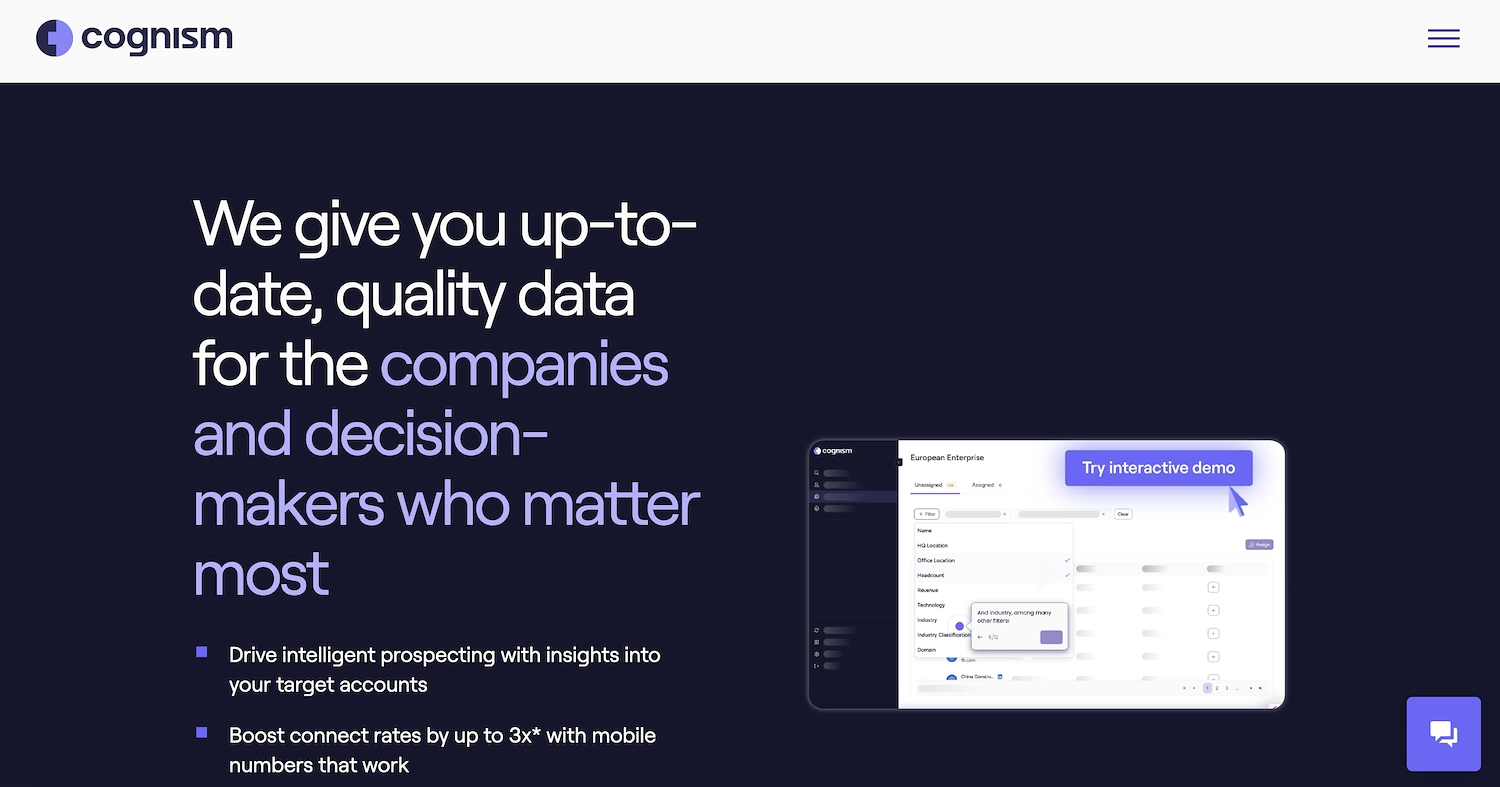
Cognism is a sales intelligence platform with contact and company data. Sales teams use it to find prospects and build outreach lists. The platform tracks signals, like job changes, to help identify opportunities when contacts move to new companies. This data supports sales efforts to connect with relevant buyers.
Cognism's Main Features
- Provides a lead builder to create targeted prospect lists.
- Offers data cleaning and enrichment to update and complete existing records.
- Includes lead intelligence features for validating and enriching contact and company data.
How Cognism Compares to Champify
Average Review Score: 4.6/5 stars based on 1,033 G2 reviews.
- Cognism provides a large database with a strong focus on European contacts. This is different from Champify, which tracks a specific list of your past champions across all regions.
- It offers direct-dial phone numbers for contacts, which can improve connection rates. Champify provides job change alerts but may not include this level of contact detail.
- The platform includes a lead builder to create new prospect lists from its database. This allows for broader lead generation compared to Champify, which finds leads only from your past customer list.
- This tool provides data cleaning and enrichment for existing CRM records. This is a broader function than Champify's focus on just alerting teams when a known contact changes jobs.
Cognism's Drawbacks Compared to Champify
- Cognism does not automatically identify past champions from a CRM. This requires teams to manually search for these contacts, a process Champify automates with job-change alerts.
- The platform's broad features for general prospecting can be complex. This is different from Champify, which offers a simpler tool focused only on tracking past customers.
- It may take longer to see a return on investment, at around 10 months. In comparison, Champify reports a faster return in about five months for its specific use case.
Cost and Value Comparison
While both tools have a high perceived cost based on user reviews, Champify reports a faster return on investment at five months versus 10 for Cognism. Since pricing models can vary, we recommend visiting the Cognism official website for the most accurate information.
9) Clearbit
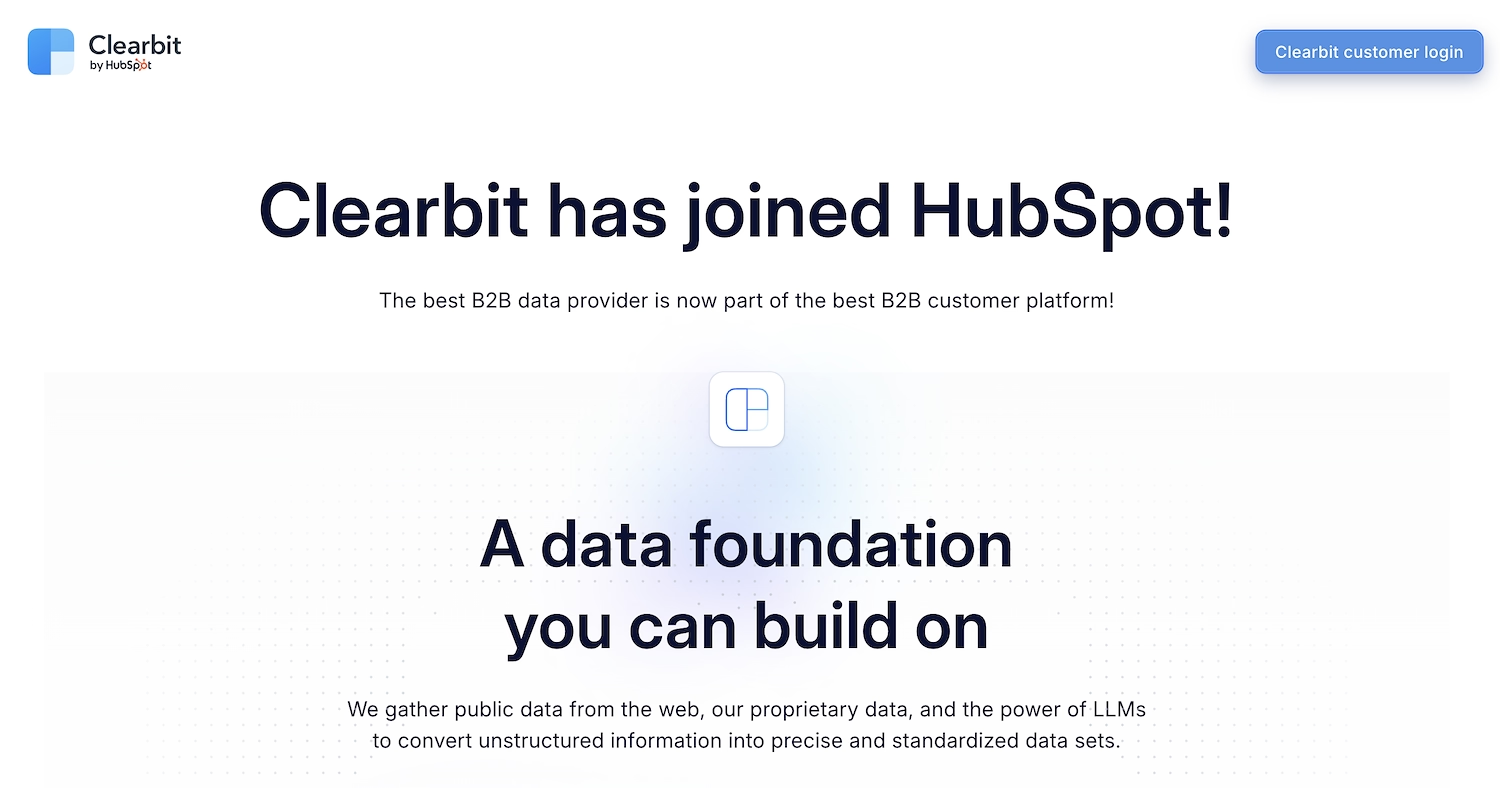
Clearbit is a data activation platform for B2B go-to-market teams. It provides intelligence to understand customers and find prospects. The platform tracks data signals, such as job changes, to alert sales teams about new opportunities. This helps representatives connect with previous customers at their new companies.
Clearbit's Main Features
- Appends over 100 data points to company and employee records for enrichment.
- Detects anonymous companies visiting a website and syncs them to a CRM.
- Shortens web forms by hiding or autofilling known fields to increase conversions.
- Integrates with CRM and marketing automation platforms to automate workflows.
How Clearbit Compares To Champify
Average Review Score: 4.4/5 stars based on 626 G2 reviews.
- Clearbit enriches records with over 100 data points. This provides a more detailed profile compared to Champify, which focuses on job change alerts.
- It identifies anonymous companies that visit your website. This offers a proactive way to find new leads, unlike Champify's model of tracking known contacts.
- The platform can shorten web forms to help increase conversion rates. This is a marketing optimization feature not found in Champify, which is a sales-focused alert tool.
- This tool integrates with marketing automation platforms to automate workflows. This is different from Champify, which primarily provides data for sales teams to act on.
Clearbit's Drawbacks Compared To Champify
- Clearbit does not automatically identify past champions from a CRM when they change jobs. This is a core function of Champify, so teams may need to perform manual searches for these specific contacts.
- Its broad feature set for data enrichment can be complex for teams that only need a simple tool. In contrast, Champify provides a focused solution for job change alerts from past customers.
- The platform has a longer time to value, with a return on investment of around 11 months. This is a longer period compared to Champify, which shows a return in about five months.
Cost and Value Comparison
While both tools have a high perceived cost based on user reviews, Champify reports a faster return on investment at five months versus 11 for Clearbit. Since pricing models can vary significantly, we recommend visiting the Clearbit official website for the most accurate information.
10) LeadIQ
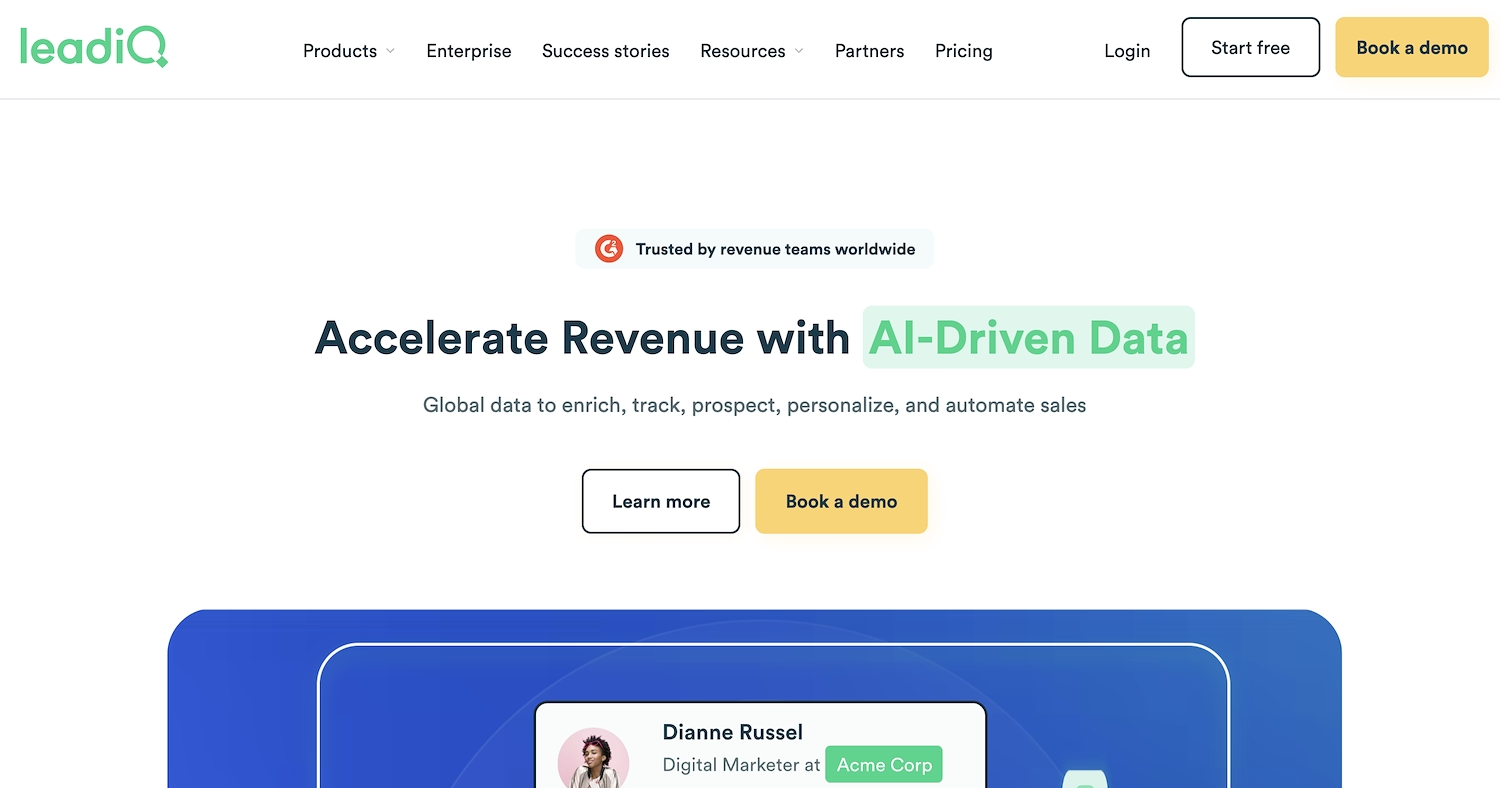
LeadIQ is a sales prospecting platform that provides contact data and tracks sales triggers. The system identifies job changes and alerts sales teams to these events. This creates new opportunities with contacts at different companies and helps teams connect with relevant buyers.
LeadIQ's Main Features
- Provides a lead builder to create targeted prospect lists.
- Integrates with CRM and marketing automation platforms for data synchronization.
- Tracks sales triggers, such as job changes, to identify new opportunities.
- Offers a Scribe feature to help personalize cold outreach messages.
How LeadIQ Compares To Champify
Average Review Score: 4.2/5 stars based on 1,097 G2 reviews.
- LeadIQ provides a lead builder to create new prospect lists. This allows for broader lead generation, while Champify focuses on tracking a specific list of past customers.
- It includes a Scribe feature that helps sales teams write personalized outreach messages. In contrast, Champify provides lead alerts but does not offer a tool for message creation.
- The platform offers several pricing plans, including a free option. This provides more flexibility compared to Champify's enterprise-level pricing model.
- This tool allows users to find new prospect data from its database. Champify's data source is limited to the contacts already present in a user's CRM.
LeadIQ's Disadvantages Compared to Champify
- LeadIQ does not automatically identify past champions from your CRM. This is Champify's main function, which automates the discovery of these specific contacts when they change jobs.
- Its job change alerts apply to any saved contact, which can create noise for sales teams. Champify provides more focused alerts because it only tracks a specific list of past customers.
- The platform's broad features for general prospecting might be too complex for some teams. Champify offers a more direct tool designed for the single task of tracking champion job changes.
Cost and Value Comparison
LeadIQ offers flexible subscription plans, including a free tier and paid options starting at $45 per user per month. This contrasts with Champify, which operates on an enterprise-level pricing model without public tiers. For the most accurate information, we recommend visiting LeadIQ's official website.
Which One Should You Go With?
Choosing the right Champify alternative depends on your team's specific needs, budget, and existing tech stack. This guide reviewed several options to help you create a shortlist for a more detailed evaluation.
If your team needs to automate sales tasks, 11x provides digital workers to manage prospecting, outreach, and meeting scheduling. This allows your sales representatives to focus on building client relationships and closing deals, rather than on repetitive administrative work.




